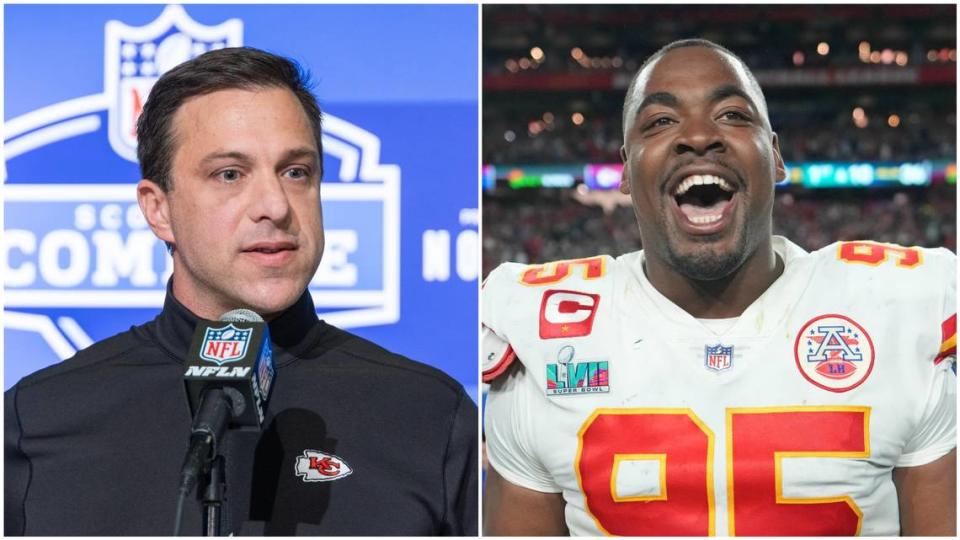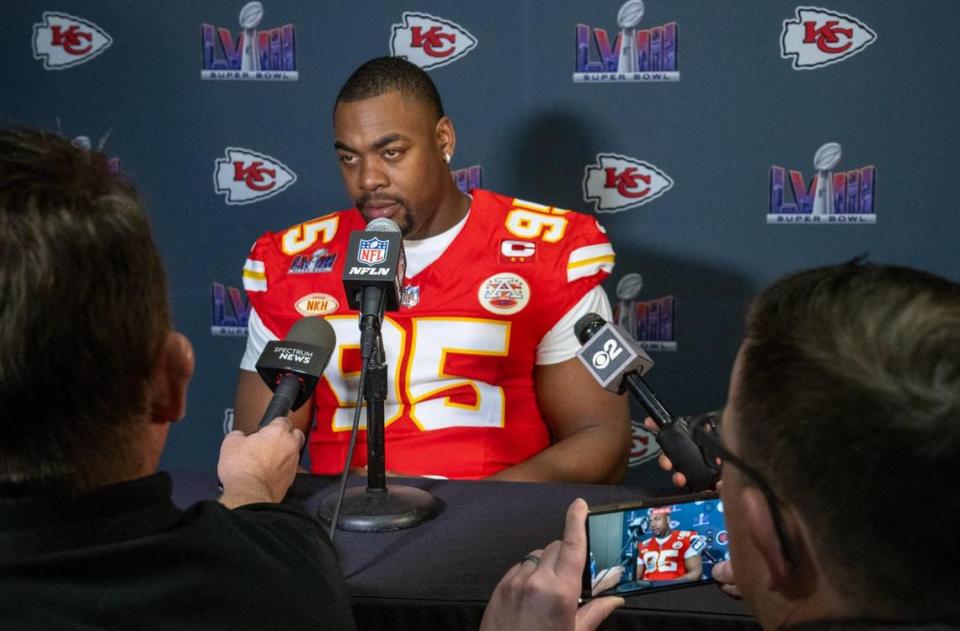This Chiefs offseason will bring about surprises. Here’s how they should respond
Andy Reid stood on a small stage inside the Indianapolis Convention Center, among the most popular guests at the NFL Scouting Combine, and soon the subject of questions about back-to-back Super Bowls, quarterback development and the word dynasty. He flinched at the last one, by the way.
It is the unofficial start of a new year — that’s how Reid thinks of it, anyway — in which the Chiefs will have the opportunity to achieve a level of success literally unmatched in NFL history.
A three-peat. But you know all about the Chiefs’ on-field success.
We’re here to talk about something that has prompted that dynasty, aside from the quarterback, even if didn’t even come up in the 15 minutes Reid stood on stage.
This is when the Chiefs really dominate. The time of the calendar year they’ve still managed to win. The part of the offseason that arrives before the chaos of free agency or the unpredictability of the NFL Draft.
To be more specific: How they handle their own impending free agents.
The headline of the Chiefs’ offseason is not about whom they will acquire but what they will do with defensive tackle Chris Jones and cornerback L’Jarius Sneed, an All-Pro and a should’ve-been All-Pro set to hit free agency in a couple of weeks.
(Sneed is a likely candidate for the franchise tag, Chiefs general manager Brett Veach acknowledged Tuesday, though that doesn’t mean he’s a lock to be back in KC next year. More on that later.)
There’s no team that has managed these big-time free agent situations better — no team that has embraced the uncomfortable bretter — and outside of Patrick Mahomes, there’s perhaps no better explanation for why they have been able to keep it rolling.
The big-picture rearview mirror displays a team that has parted ways will instrumental pieces — with not only wide receiver Tyreek Hill and safety Tyrann Mathieu, but also with important cogs like Charvarius Ward and Orlando Brown, among plenty of others.
Heck, Hill is still arguably the most valuable receiver in football. The Chiefs just won two Super Bowls without him, like his departure didn’t even matter, all while the world criticized their wide receiver room.
Why? Because they prioritized the return assets and the cap space for a franchise that has so little of it.
The same blueprint must occupy the vision through the windshield — practicality over sentimentality.
The Chiefs haven’t won three of the past five Super Bowls because of nostalgia. Mahomes, Reid and Travis Kelce do a hell of a job disguising it, but the Chiefs have won because of a willingness to change. All of three players have started each of those three Super Bowls: Mahomes, Kelce and Jones. That’s the entire non-special teams list.
Don’t confuse this with an argument the Chiefs should just let Jones, Sneed and everyone else due for free agency walk. Or that they should trade everyone before it reaches that point. Or that they should sign no one who might be expensive.
But they have to be more careful than most. They already have been more careful than most. The lessons are from themselves.
The Chiefs won Super Bowls with Patrick Mahomes occupying 17.0% of the salary cap in 2022 and then 16.9% of it in 2023. His number will jump — and quite significantly, barring restructures — over the next three seasons. It’s never been more important to value an impending free agent for what he will be (and how he fits in the cap) rather than a reward for what he’s already done. Too many teams make mistakes that derive from the latter.
The Chiefs have never been tested more with it, and I say that for two reasons:
• Becoming the first team in NFL history to three-peat has to be awfully enticing, right? What better time, you might wonder, to push the chips into the middle?
• The NFL salary cap surged to $255.4 million, a $30 million jump that surprised even those in the business.
That can’t change the big-picture approach that has progressed the Chiefs to this point. And based on Reid’s comments with local media Tuesday, shortly after his stint on stage, it doesn’t seem as though it will.
“I don’t think we’ll change that philosophy. I don’t see that,” Reid said. “Though we’d love to have those two (Jones and Sneed) back.”
The Chiefs spend the early portions of every offseason, and even the days preceding it, developing contingency plans. Developing plans for the “what ifs?” It’s allowed them to be content with implementing Plan B.
There are surprises in every offseason. Some teams panic or overreact. The Chiefs’ ability to navigate to storm — or even ignore it altogether — has been paramount.
Will be paramount.
“Things typically never go exactly how you want,” Veach said. “You have to prepare for these opportunities in the calendar season as if they will go exactly how you want — but at the same time, you have to be realistic.”
The next couple of weeks will swerve based on the outcomes of Sneed and Jones. Franchise-tagging Sneed does not settle that situation — that would just buy time to work out a long-term deal. If they are unable to do so, they will consider a trade, per sources.
Why?
The long-term.
They will have similar decisions, even if on a lesser or at least a less expensive scale, to make with players like Mike Danna and Willie Gay, among others. They might lose one or two of the names that headline the list, Jones and/or Sneed. Done that before. They even more likely will say goodbye to players they plucked in the middle or even late rounds of a draft and then developed, some beyond expectations. Now, another team will have the benefit of those rewards.
So be it. The Chiefs will have to accept change once more. It’s what has led them to the rewards of a different kind.



